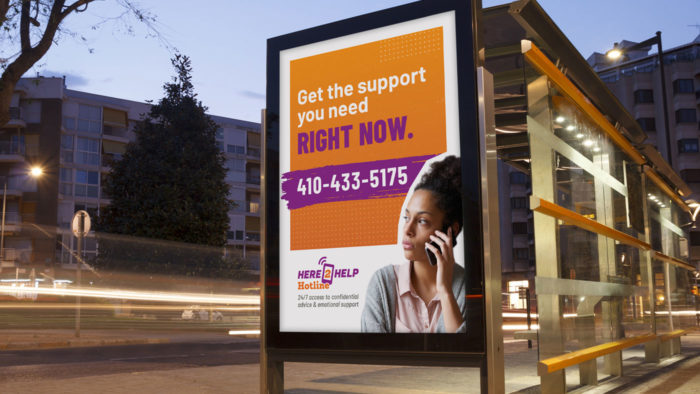
Critical Mental and Behavioral Health Resources
By Natasha Lesser, Hatcher Vice President
The Hatcher Group — and the world — recognized World Mental Health Day on October 10 — a day with more significance than ever given the serious impact of COVID-19 on people’s mental well-being. Since the pandemic began, rates of anxiety, depression, attempted suicide, and overdose death have soared across Maryland and the entire country. People are in need of support services, and Hatcher is proud to work with our client partners to reach out to communities to increase the use of these critical resources.
For example, we’ve been working with Maryland 211 to develop a communications campaign to raise awareness about its statewide call center network that connects people to needed health and human resources. Partnering with the Maryland Behavioral Health Administration (BHA), we’re working to encourage citizens to use the 211 Press 1 crisis and referral line for mental health and substance use issues. A second component of the awareness campaign is Maryland 211’s introduction of its 211 Health Check tool, created by the Thomas Bloom Raskin Act in honor of Congressman Jamie Raskin’s son who died by suicide. The program is the first of its kind nationwide by providing mental health check-ins for those who could benefit from them. By simply texting “HealthCheck” to 211MD1 (211631), Marylanders can initiate outreach from a trained and caring 211 specialist. Each week, that same specialist will check in with the participant, ask them how they’re doing, and connect them to resources as appropriate.
To promote awareness of Maryland 211 Press 1 and 211 Health Check across the state, we placed media in a number of regional publications, including Help for Those Who Need It — WYPR; Help is Available — Southern Maryland News; Grassroots Executive Director Promotes 211 Maryland on WBAL-TV — Patch; and Help is a Call Away — Cecil Whig.
To understand how best to reach people across the state and communicate about 211 Press 1 and 211 Health Check, we did our homework, conducting market research and message testing to gather information firsthand on how to move people from greater awareness of 211’s mental and behavioral health services to increased usage of its services. We then created messaging that was empathetic, engaging, and nuanced to address specific audiences and their perceived and tangible barriers to asking for help. We’re currently designing materials and preparing to launch an advertising and social media campaign.

Another resource we helped promote was the Behavioral Health System Baltimore (BHSB) Here2Help Hotline. BHSB, a Baltimore-based nonprofit manages the city’s system of care, addressing emotional health and well-being by providing services for individuals with mental health and substance use disorders. We began our work with BHSB in 2019 to promote its critical but insufficiently used services; the pandemic made the need greater. Hatcher developed an ad campaign using digital and transit ads to promote the hotline. Following the launch of the campaign, calls to Here2Help increased 100% from the previous quarter, as highlighted in the Baltimore Sun. Digital ads received nearly 5.1 million impressions and drove more than 61,000 clicks to the BHSB website.
We’re also focused on suicide and overdose prevention in our work with the Centers for Disease Control and Prevention’s (CDC) National Center for Injury Prevention and Control (NCIPC). We’ve helped the Injury Center update messaging around its comprehensive and coordinated public health approach to prevent suicide and address the broad range of contributing factors linked to suicide with digital communications support.
Our hope is that our strategic communications expertise will help our clients promote their available resources, so that people in the community are aware of and comfortable using the critical mental and behavioral health services available to them.